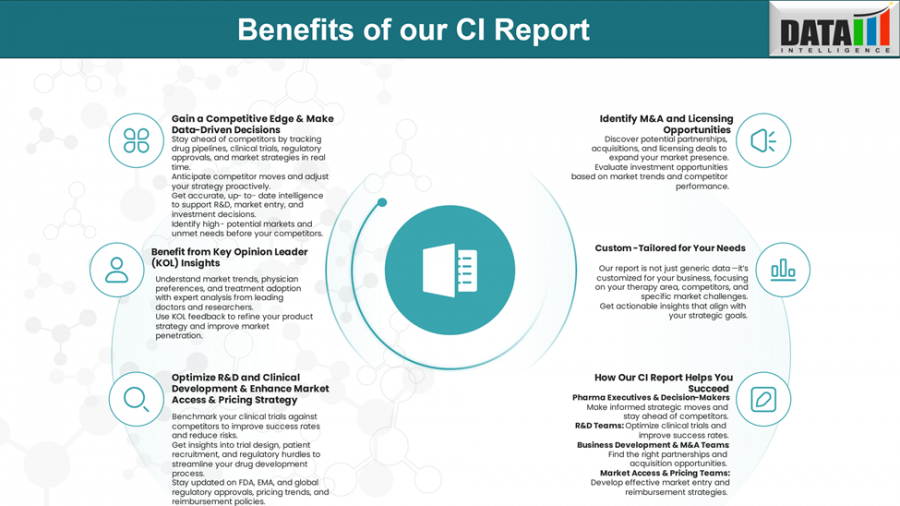
Rewriting the Playbook in MPS I: CNS-Penetrant ERTs and Gene Therapies Usher in a New Treatment Era | CI Insights
Emerging CNS‑targeting ERTs and gene therapies for MPS I show promise for neurocognitive benefits, reduced treatment burden, and better outcomes.
AUSTIN, TX, UNITED STATES, June 15, 2025 /EINPresswire.com/ -- Mucopolysaccharidosis type I (MPS I) is an inherited, life‑limiting metabolic disorder caused by deficiency of alpha‑L‑iduronidase (IDUA). This enzyme shortfall leads to the harmful buildup of glycosaminoglycans (GAGs) across multiple body systems—affecting the heart, bones, eyes, and often the brain. Currently, MPS I subtypes range from severe Hurler disease to milder Scheie variants.
Download CI Sample Report: https://www.datamintelligence.com/strategic-insights/sample/mucopolysaccharidosis-type-i-mps-i-treatment-revolution-the-role-of-innovative-gene-therapy-in-addressing-unmet-needs
MPS I Epidemiology in Context
- Incidence stands at about 1 in every 100,000 births, affecting boys and girls equally, and transcending race and ethnicity.
- Disease burden includes organ enlargement, skeletal deformities, respiratory challenges, and, in severe cases, neurocognitive decline.
- Early diagnosis, often triggered by symptom onset in infancy or early childhood, is critical for maximizing treatment success.
The Approved Standard of Care: Aldurazyme & Stem Cell Transplant
- Aldurazyme, the sole U.S. FDA-approved enzyme replacement therapy (ERT), replaces IDUA weekly via IV infusion. It alleviates somatic symptoms but does not cross the blood-brain barrier (BBB), leaving cognitive function unaddressed.
- Stem cell transplant (SCT) remains an option for infants with severe disease, with potential benefits to neurodevelopment, but it carries procedural risks and lifelong implications.
New Wave: Gene & Cell Therapies Targeting the Brain
The therapeutic landscape is expanding beyond symptomatic relief to target neurological decline:
- CNS-penetrant ERTs: These next-gen enzymes are engineered to cross the BBB, offering the potential to prevent or reverse neurocognitive damage. They also reduce infusion burden, with longer half-lives and possibly monthly or quarterly dosing.
- Gene therapies: Using viral vectors (e.g., AAV), these one-time IV treatments aim to restore IDUA production long-term. Strategies delivering genes to the liver or brain promise persistent enzyme expression and reduced need for chronic therapy.
Competitive Landscape: Treatment Dynamics Are Shifting
Aldurazyme continues to dominate, but newer therapies present meaningful differentiation:
- Neurological efficacy is no longer optional; emerging therapies claim both somatic and CNS impact.
- Convenience has shifted, with extended dosing intervals or single-dose approaches minimizing hospital visits.
- Patient‑centric design brings home administration and fewer infusion reactions.
- Economic value is critical—upfront costs for gene therapy may exceed traditional ERT, but lifetime cost-savings and improved outcomes argue for sustainable reimbursement.
Drivers of Market Disruption: Why the Shift Matters
- Unmet neurological need has long plagued MPS I care. New therapies can potentially protect brain function and improve developmental outcomes.
- Reduced burden through less frequent infusions or one-time therapy improves life quality and relieves caregivers.
- Health economics play a growing role—durable benefits may justify high cost if supported by clinical and real-world evidence.
Target Opportunity Profile (TOP): The Future Benchmark
New therapies must excel in the following areas to challenge Aldurazyme:
- Mechanism: Efficacy in both systemic and CNS compartments, ideally through gene therapy or BBB-penetrant ERT.
- Efficacy: Not just symptom control, but meaningful cognitive and functional gains.
- Safety: Low immunogenicity, minimal IV reactions, good long-term tolerability.
- Duration & convenience: From weekly infusions to monthly or even single-dose administration.
- Patient burden & pricing: Easier use, fewer hospital visits, cost-effectiveness supported by outcome gains.
Innovation: Leading-edge delivery platforms and CNS targeting technologies.
- Durability: Long-lasting effects, reducing or eliminating lifelong therapy.
- Stakeholder Implications
- Pharma developers need a sharp competitive edge—focusing on CNS-permeable technologies, early biomarker validation, and clear value communication with payers.
- Investors are watching as the field evolves; strong clinical data and regulatory clarity will unlock opportunities.
- Clinicians and families look forward to treatments that protect both body and brain—delivering hope where current ERT falls short.
Book Your Free CI Consultation Call: https://www.datamintelligence.com/strategic-insights/ci/mucopolysaccharidosis-type-i-mps-i-treatment-revolution-the-role-of-innovative-gene-therapy-in-addressing-unmet-needs
What Comes Next?
In the next 12–24 months, pivotal data is expected: early-phase CNS-penetrant ERT trials and initial gene therapy readouts. One-time gene treatments could file for approval by 2027, while translational data from ERTs may inform near-term regulatory submissions.
About Our Competitive Intelligence Report
Our new MPS I Competitive Intelligence Report offers:
- A granular analysis of pipeline programs with clinical milestones
- Scenarios modelling market uptake and patient outcomes
- Regulatory trends, pricing strategies, and reimbursement benchmarks
- Strategic insights tailored to drug development timelines and stakeholder positioning
Closing Perspective
We stand at a transformative moment in MPS I care. Where once the focus was limited to somatic symptom management, we now envision a world where neurodegeneration is preventable—and perhaps reversible. The next wave of therapies—CNS-targeting ERTs and gene therapy—appears poised to deliver just that, redefining not only how we treat MPS I, but what treatment can achieve.
Read Related CI Reports:
1. IGA Nephropathy Emerging Market Therapeutic Opportunities
2. Transthyretin Amyloid Cardiomyopathy Genetic Disease Modifying Therapies
Sai Kumar
DataM Intelligence 4market Research LLP
+1 877-441-4866
email us here
Visit us on social media:
LinkedIn
X
Distribution channels: Healthcare & Pharmaceuticals Industry
Legal Disclaimer:
EIN Presswire provides this news content "as is" without warranty of any kind. We do not accept any responsibility or liability for the accuracy, content, images, videos, licenses, completeness, legality, or reliability of the information contained in this article. If you have any complaints or copyright issues related to this article, kindly contact the author above.
Submit your press release
